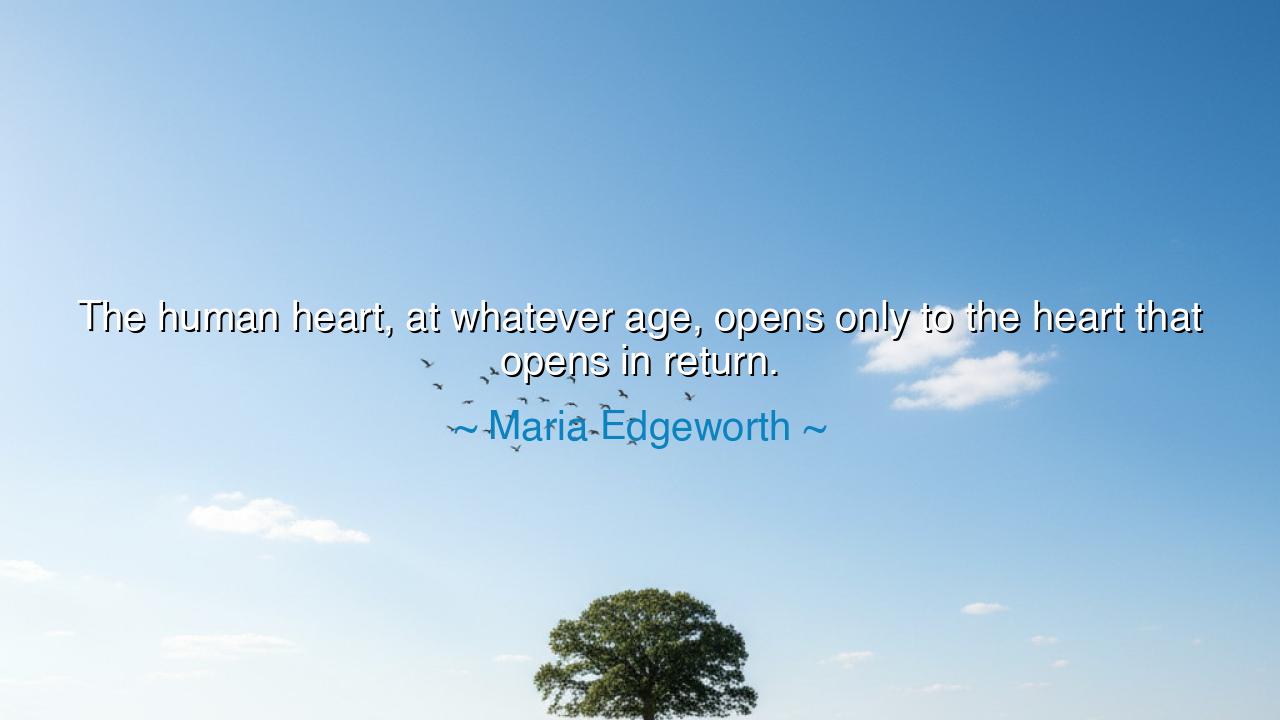
The human heart, at whatever age, opens only to the heart that






"The human heart, at whatever age, opens only to the heart that opens in return." — so wrote Maria Edgeworth, the Irish novelist and moral philosopher whose words capture a truth both ancient and eternal. In this gentle yet profound observation, Edgeworth speaks not only of love, but of the very nature of human connection. She reminds us that the heart, though capable of boundless feeling, cannot truly flourish in isolation. Like a flower that blooms only when touched by sunlight, the heart awakens only in the warmth of another’s sincerity. Her words echo across time: love, friendship, trust — all these sacred bonds depend not on one soul’s offering, but on the mutual opening of two hearts.
In the style of the ancients, one might say: no vessel can be filled unless another hand tilts the jug toward it. Maria Edgeworth, who lived during the late eighteenth and early nineteenth centuries, wrote of manners, morality, and the invisible threads that bind society. Her writings often explored the balance between reason and emotion, intellect and affection. Yet here, she speaks in the language of pure humanity — of the reciprocity of the heart. She knew that no matter how noble one’s feelings, they wither when left unanswered. The heart is not a solitary instrument; it is a duet, designed to resonate only when another’s pulse beats in harmony.
Her insight is not confined to romance, but extends to all relationships that give life meaning. In friendship, in mentorship, in the bond between parent and child, the same truth holds: the heart cannot sustain connection if it meets only silence. A gesture of love demands acknowledgment; a word of kindness calls for echo. Without reciprocity, affection becomes longing, generosity becomes exhaustion. Thus, Edgeworth’s wisdom carries both tenderness and warning: to keep love alive, one must not only give but also receive.
Consider the story of Eleanor Roosevelt, a woman of immense compassion and courage. In her youth, she struggled with shyness and feelings of inadequacy, her heart closed by loss and neglect. Yet when she met Franklin Roosevelt, and later when she found purpose in serving others, something within her changed. The more she gave of herself — her care for soldiers, her defense of the oppressed — the more the world’s heart opened in return. Letters poured in from those she had inspired, strangers became friends, and her once-guarded heart became a beacon of warmth. Her openness invited openness, proving the truth of Edgeworth’s words: that love and trust grow not through possession, but through exchange.
Maria Edgeworth’s wisdom also reveals the secret of understanding across generations and divides. The phrase “at whatever age” reminds us that youth and age are not barriers, only states of the heart. A child opens freely, without fear; an elder opens cautiously, with wisdom born of pain. Yet both respond to the same eternal signal — sincerity. No heart, however young or weathered, can resist the honesty of another’s love. It is only when pride, fear, or deceit seal one heart shut that connection fails. Therefore, to live fully, one must cultivate the courage to be open — to risk rejection, to share truth, to love first.
The lesson in Edgeworth’s words is as practical as it is poetic: if you wish to be loved, love first. If you desire friendship, offer it. If you seek understanding, listen with your own heart unguarded. The world reflects the energy we give it; the hearts of others mirror our own. To wait for another to open first is to wait in vain — for the door of the heart responds not to demand, but to invitation. Open your heart, and others will follow.
And so, my child, remember Maria Edgeworth’s eternal counsel: that the human heart is not a fortress to be defended, but a bridge to be crossed. Fear not the vulnerability that comes with openness, for it is the gateway to life’s deepest joys. Whether in youth or in age, whether in friendship or in love, this law endures — that hearts open to hearts. The one who dares to love first, to reach across silence and offer warmth, becomes the spark that awakens others. For in the end, it is not intellect, achievement, or wealth that binds us together — it is the reciprocity of the heart, beating in rhythm with another’s, that makes life sacred.






AAdministratorAdministrator
Welcome, honored guests. Please leave a comment, we will respond soon